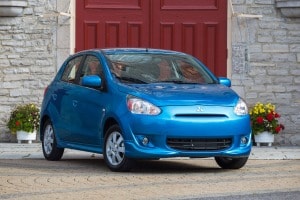Meet the 40 MPG Club
 Edmunds.com
Member, Administrator, Moderator Posts: 10,316
Edmunds.com
Member, Administrator, Moderator Posts: 10,316
 Meet the 40 MPG Club
Meet the 40 MPG Club
Just as gas prices reach record highs, we review the ranks of the most fuel-efficient gasoline-powered cars you can buy. These cars get 40 mpg on the highway and range from family sedan to wacky runabout.
Tagged:
0

Comments
My 1999 Saturn SL2 was rated at 38 MPG highway, but regularly got 40+ MPG in solid highway driving. It had most of the safety features we expect today, ABS, traction control, airbags (though front driver and passenger only, no side airbags). It had a reasonable amount of power with its DOHC 16v 1.9 liter engine and 5-speed manual. IIRC the '99 SL1 with its SOHC engine was rated at 40 MPG with a manual.
In high school I had a 1986 Nissan Sentra XE that regularly got 40+ MPG on the highway, with an 8 valve 1.6 liter engine and 5-Speed.
I know the EPA revamped the way it did testing and that resulted in MPG rating drops pretty much across the board. However, the ability to make vehicles that get 40+ MPG is not new technology. While I hate the rising gas prices, perhaps they will shift the focus of the US car buying market from big engines and big vehicles to smaller vehicles and better fuel economy.
These new vehicles are a step back in the right direction, its a shame that we stepped away from that direction in the first place though, or who knows how much better fuel economy would be now.
I can see ruling out the cars that plug in, like the Leaf and the Volt, but the Prius and most hybrids are entirely gas powered.
When I was in high school and college, mid-late 70's, the economy cars were getting 30, 35, 40 mpg. This was for cars like the Chevette, Pinto, Le Car, Civic. Conventional engines; not hybrids.
Today, even hybrids that get over 40 mpg are so few you can count them on one hand. There's something very fishy here. The things that they're working on in car design are not the things that increase economy of operation, that's for sure. Today's cars are faster than they need to be, more luxurious than they need to be.
But they don't get the gas mileage that they should be getting in the 21st Century.
I can only wonder how much higher this figure would be if I drove this car only on the freeway (with no stop and go traffic).
In addition, I used to drive a 1990 Toyota Camry V-6, and I remember when that car would get me up to 32 MPG using the "original" gasoline (no ethanol on those early years). After the EPA MANDATED the fuel to be "oxigenated" the fuel mileage WORSENED by the same percentage of the blend on the gasoline (-10 %). I also wonder how much better this fuel mileage would be on this 2010 Civic if "TRUE" gasoline were used.
I'm still happy to get the 43.33 MPG (CONSISTENTLY) on this car!
Are the people @ Honda keeping this fact about the 2010 Civic as a "little secret"?
That isn't even close.
My Prius does not give up quality, utility, interior space, comfort or reasonable performance to accomplish that. It absolutely amazes me that I am unable to find another make of a new car which competes with my used car after five years. There should be a selection of competing cars by now.
There will be something better than the internal combustion engine but I don't know what it is yet. I do know hybrids todays best technologies like lithium ion batteries are heaver and slower than my car. Are hybrids really green?
-- Carroll Lachnit, features editor, Edmunds
The engineers need to revisit the old drawing boards, instead of reinventing the fuel efficient car. The '95 civic is not cutting edge technology!
What a scam !!!!!!!!!!!!!!!!!!!!!!!!!!!!!!!!!!!!!!!!!!!!!!!!!11111
nothing disingenuous about it...
the cars you cite had little or no emissions equipment, A/C, cruise, moonroof, power anything, airbags, crash standards...shall I go on? All of the above takes a toll on fuel economy. Would we be willing to give these features up? Not bloody likely! Your premise is false.
http://www.fuelly.com/car/nissan/altima/2011
Cars are much heavier now due to the extra power, larger sizes, safety standards, and added luxuries but they actually achieve their EPA rating.
If they could legally make a 2,000 lb Prius it would probably get 100mpg.
Thanks, Edmunds. This kind of fluff is why I don't have a bookmark for your site anymore.